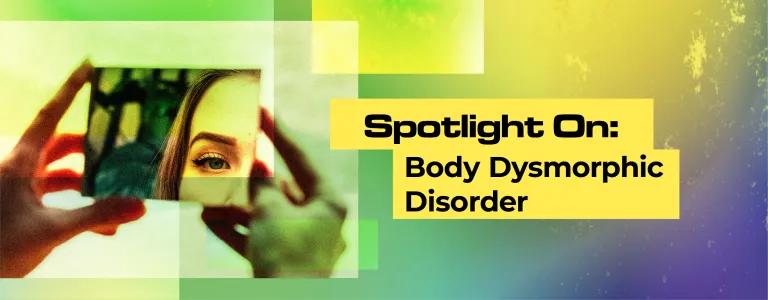
Spotlight On: Body Dysmorphic Disorder
It’s the fourth installment of our new series Spotlight On, where we explore issues that matter the most to you, with professionals in those fields.
This time we’ve partnered with the Body Dysmorphic Disorder Foundation - who aim to advance education and understanding of Body Dysmorphic Disorder, reduce stigma, discrimimnation and isolation caused by it and develop a sense of community for those affected by it. They’re here to talk about what Body Dysmorphic Disorder is and how you can find help if you need it…
What is Body Dysmorphic Disorder?
Body Dysmorphic Disorder, or BDD, is not about being vain. In fact, it's the opposite of vanity. People with BDD are concerned about perceived defects or flaws in their appearance that are not noticeable to others, and typically worry that they look ugly or abnormal.
People with BDD often feel defined by their flaws. They often experience an image of their perceived self associated with memories, emotions and bodily sensations - as if seeing the flaw through someone else's eyes, even though what they ‘see’ may be very different to their actual appearance observed by others.
These worries may make people feel anxious, depressed, disgusted and/or ashamed of the way they look. People with BDD may carry out various behaviours like repeatedly checking how bad their perceived flaw is in mirrors and reflective surfaces, attempting to check or camouflage (covering up) their perceived flaws and avoiding public or social situations that could trigger increased distress. This can be extremely time- consuming and interfere in people’s lives.
Is there treatment for BDD?
If you feel like you may have BDD, or if you’ve been diagnosed with it, the good news is that treatments are available. The best evidence so far supports two possible treatment options, which can be delivered independently of each other, or together. The first is Cognitive Behaviour Therapy (CBT) and the other option is medication.
In the UK, CBT is the treatment recommended by the National Institute for Health and Care Excellence (NICE), which provides treatment guidelines based on the best available evidence. If you get CBT therapy, it’s likely that you’ll do the following things:
- Learn about BDD, anxiety, and key psychological processes associated with the condition
- Learn how to understand your own BDD , in particular the behaviours which you engage in and how these fuel worries about appearance and difficult emotions
- Practice reducing your BDD-related behaviours, with the help of your therapist and maybe also your family and friends. This will involve physically carrying out tasks and challenges in sessions. It is important to note that this process is done gradually, in steps that feel manageable for you
You may also practice how to shift your focus of attention from your appearance to the world around you, learn how to use mirrors in a helpful and non-judgemental way, learn techniques to improve your self esteem, work directly with specific unhelpful thoughts, and go through any relevant, difficult experiences from your past.
What should I do if I think I have BDD?
If you think you might have BDD, arrange to see your GP and speak to them about it. They’ll be able to refer you for an assessment with a mental health professional, who will help you figure out whether or not you have it, and what to do next.
It’s important to remember that BDD is unlikely to just get better by itself. So, if you think it sounds like something you’re going through, it’s really important that you try and reach out to someone. Try to speak to someone you trust and maybe share this information with them to help explain how you are feeling.
What else can I do?
In this day and age, social media is an important part of everyone’s lives. However, sometimes our relationships with social media can become an issue, especially for people who have BDD. It can be something that gets people into vicious cycles of being overly focused on their appearance, and also exposes us to unhealthy and unrealistic messages about appearance which can in turn affect your body image.
Be kind to yourself when it comes to using social media; set limits for how many times a day and how long you access certain apps, avoid, unfollow, or delete any accounts that make you feel uncomfortable within yourself, and follow ones that will boost your confidence (like ours!). And remind yourself that what you see online is a highlight reel, not real life.
Who can I talk to?
Your first port of call should be your GP. Arrange to see them and they will help you find mental health help.
But we are also here for any questions you may have! Check out our website for more information about BDD, and use our email helpline to raise any concerns or ask questions. You can also read through all the stories on our website from people who have BDD, to see how they are getting on, what treatment they got and what it means for them.




